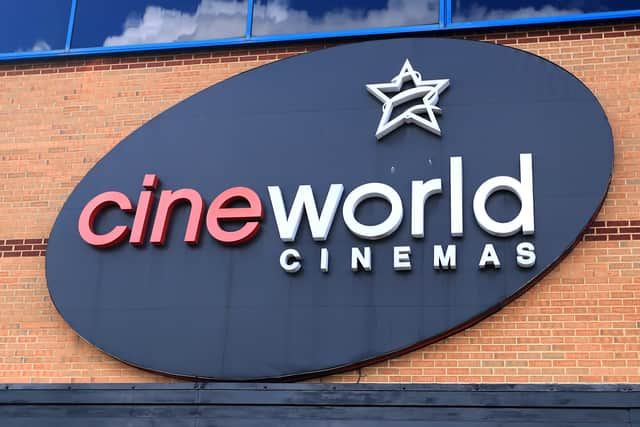What is chapter 11 bankruptcy? Meaning, and how it compares to insolvency - as Cineworld share price plunges
This article contains affiliate links. We may earn a small commission on items purchased through this article, but that does not affect our editorial judgement.
and live on Freeview channel 276
Cinema chain Cineworld is reported to be on the verge of filing for bankruptcy in the US, according to the Wall Street Journal.
The British business has previously said it was being hampered by the film industry’s recovery from the Covid-19 pandemic, while it is also struggling with $4.8 billion in debt.
Advertisement
Hide AdAdvertisement
Hide AdIt is currently the world’s second largest cinema group with 9,189 screens in 10 countries, and - alongside its core Cineworld brand - also owns the Picturehouse chain in the UK and major American brand Regal cinemas.
So what is a chapter 11 bankruptcy - and what has happened to Cineworld?
Here’s everything you need to know.


What has caused the Cineworld bankruptcy?
Cineworld Group is a huge business, operating in 10 countries including the UK, USA, Poland and Israel, and employing 28,000 people.
Its 9,189 screens at 750 sites around the world generated $1.8 billion (£1.5 billion) in 2021 - although this figure is dwarfed by revenues of $4.4 billion the group generated in 2019 before the pandemic.
Advertisement
Hide AdAdvertisement
Hide AdIndeed, multiple Covid lockdowns and the slower-than-hoped return of audiences to its multiplexes have hammered its business.
In its financial reports and accounts for 2021, published on 12 August, Cineworld Group said: "Despite a gradual recovery of demand since reopening in April 2021, recent admission levels have been below expectations.
"These lower levels of admissions are due to a limited film slate that is anticipated to continue until November 2022 and are expected to negatively impact trading and the group’s liquidity position in the near term."


While blockbusters including James Bond: No Time To Die, Top Gun: Maverick and Thor: Love and Thunder have all been released to great fanfare over the past 12 months, major film output still remains behind pre-Covid times.
Advertisement
Hide AdAdvertisement
Hide AdThis has been reflected in lower audience figures, with total box office takings this year almost a third lower than in pre-Covid times.
At the same time as seeing a tumble in revenues, Cineworld has seen its debts rise to $4.8 billion (£4 billion).
Its accounts said it would need to secure refinancing before many of these debts came due, while it would need revenues to pick up once again to pay these debts off.
The group also cited higher debt costs and a lower credit rating as issues in the document.
Advertisement
Hide AdAdvertisement
Hide AdNow the Wall Street Journal says Cineworld Group is preparing to file for a chapter 11 bankruptcy in the US.
The news has been greeted by a 60% drop in the company’s share price.
What is a chapter 11 bankruptcy?
A chapter 11 bankruptcy is a US legal mechanism that shields a company from its creditors for a period so that it can reorganise its business.
This breathing space is intended to allow the company to keep trading, while also letting it come up with a plan for how it will pay off its debts.
Advertisement
Hide AdAdvertisement
Hide AdSo, in essence, Cineworld is likely to remain open for several months at least.
While this sounds similar to the administration process here in the UK, the two mechanisms are different.


Chapter 11 does not necessarily:
- Mean the company is insolvent (i.e. unable to pay its debts)
- Involve the appointment of external administrators
- Let the company make certain decisions without prior approval from the courts.
The lenders the business in question owes money to can apply for a chapter 11 bankruptcy in court, or the indebted company can voluntarily file for it.
Within 120 days, the company has to submit its reorganisation plan to the court that must then be approved by creditors.
Advertisement
Hide AdAdvertisement
Hide AdIf no plan materialises or the plan is not backed by a two-thirds majority of lenders, the creditors can themselves submit a plan of action.
What is insolvency?
Insolvency is when a business cannot pay off its debts (e.g. utility bills, or loans) when they become due.
It might lead to the business being taken to court by its creditors, or it could lead to administrators being brought in.
Unlike bankruptcy, insolvency is not the result of a court order.
But if the insolvency lasts for a prolonged period, it can become a bankruptcy.
Comment Guidelines
National World encourages reader discussion on our stories. User feedback, insights and back-and-forth exchanges add a rich layer of context to reporting. Please review our Community Guidelines before commenting.
